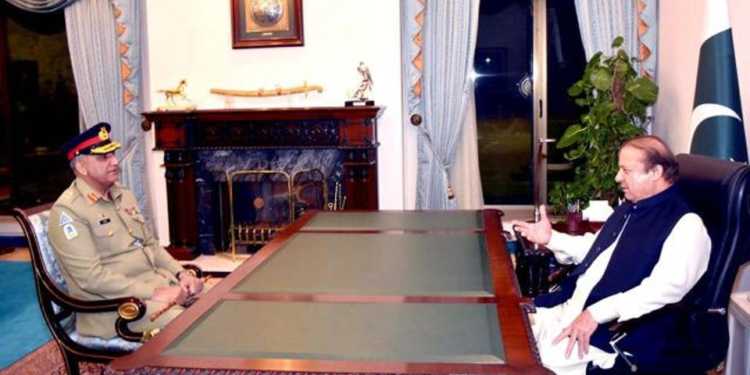Yet another political crisis has emerged in Pakistan, this time being spurred by an anti-corruption Court’s verdict that has convicted and sentenced former Pakistan Prime Minister Nawaz Sharif to ten years imprisonment. The National Accountability Bureau (NAB) court has sentenced Nawaz Sharif to ten years in prison along with a fine of 8 million pounds in corruption charges relating to four luxury apartments in London. His daughter and son-in-law have also been convicted. Nawaz Sharif is in London, at the sickbed of his wife Kusloom Nawaz, who is on a respirator after receiving treatment for throat cancer. Nawaz Sharif had therefore made a plea for a week-long delay in the verdict but his request was denied and the verdict was announced in his absence. Sharif has not only been convicted in absentia but has also been handed a stringent punishment.
Sharif has stated that the charges are politically motivated and has promised to return to Pakistan. The UK has no formal extradition treaty with Pakistan which raises further concerns, although section 194 of the Extradition Act, 2003 allows special extradition arrangements in exceptional cases.
Nawaz Sharif represents the closest Pakistan can get to a civil democracy as against military high-handedness and dictatorship. Recently, Sharif had openly stated in a veiled reference to the Pakistani military that his fight is not against Pakistan-Tehreek-i-Insaaf led by Imran Khan or Zardari’s Pakistan People’s Party but with the “aliens”. This was a reference to the extra constitutional establishment in Pakistan which is infamous for hijacking governance from the elected government. A couple of days later, sitting Prime Minister Abbasi had even more clearly stated that the upcoming general elections in Pakistan would be held by “aliens”. He added that though the elections would be held by aliens and invisible forces, his party “Pakistan Muslim League (PML)” would contest the elections. This went on to show that even the sitting government was wary of certain elements and was not expecting transparency in elections. This only goes to show how Pakistan is being ruled by the military establishment along with terror outfits and the clergy.
Interestingly, Sharif’s conviction has come just before the Islamic country goes to national elections this month. The timing of the conviction speaks for itself. General elections are to be held on July 25, 2018 suggesting that Sharif might have been convicted with the upcoming elections in mind. The conviction seems suspicious and mala fide, not only because of Sharif’s cold relations with the Pakistani military, but also because Imran Khan has emerged as the military-backed contender for the top post. Khan has been seen as someone having warm ties with the military that controls almost everything in Pakistan behind the curtains. On the other hand, Sharif has time and again tried asserting control of the civil government in the country, irking the Pakistani military and making Sharif an intensely hated figure within Pakistani military circles.
It seems the prophecy of the “invisible forces” and “aliens” holding elections has turned out to be true. Like every walk of life in Pakistan, these invisible forces not only influence the electoral process but exercise absolute control over the entire process. This corroborates that Pakistan is an undemocratic country ruled by military and Islamic diktats. Nawaz Sharif’s downfall makes it clear, that no matter what the form of government in Pakistan is, its nature is invariably going to be militaristic governance.

























